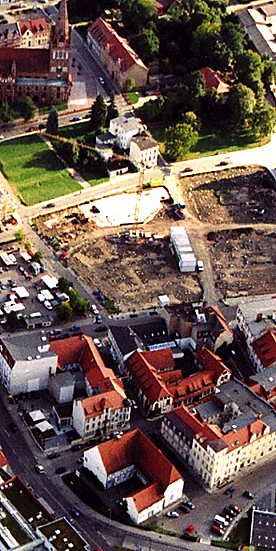Housebuilding and house utilisation in medieval Eberswalde. A social topography of houses in the North German lowland and southern coastal areas of North and Baltic sea

The old town of Eberswalde is unique in northern Germany for its archaeological inventory of remains of wooden houses dating from the late 13th and 14th century, which were excavated in 1995 and 2004. Based on a scientific assessment of the excavations’ findings, insights were gained into building, building materials, (re) construction and the use of structures as well as about the people who constructed the dwellings.
The aim of this research project is to identify the different functions and builders of each construction based on variation in appearance in terms of floor plan, size and structure, and to examine this ratio within the urban fabric Eberswalde. Considering socio-topographical aspects will allow for an overview that can provide important information on the settlement and expansion pattern of the city, something that is not yet available for the northeast of Germany.
The data obtained for the old town of Eberswalde will serve as fundamental for the comparison of settlement and development processes of other medieval towns in the study area. Through this, changes in the construction and the use of nature are explored and explained, taking into account regional and traditional peculiarities. Further to this, a comparative study will explore the ways in which socially-determined opportunities effected builders’ choices relating to building materials as well as the construction and appearance of homes in different cities.
This project collaborates with the Brandenburg State Office for Monument Conservation (Brandenburgisches Landesamt für Denkmalpflege) und the Archaeological State Museum (Archäologisches Landesmuseum).
The dissertation was published in 2020 under the title Hausbau und Hausnutzung im mittelalterlichen Eberswalde (Forschungen zur Archäologie im Land Brandenburg 21, Brandenburgisches Landesdenkmalamt für Denkmalpflege und Archäologisches Landesmuseum, Wünsdorf).
Researcher: Jenny Wiese
